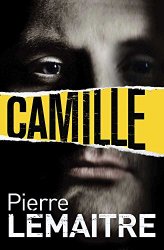Camille - Pierre Lemaitre
 Poor old Camille Verhoeven. As if being four foot eleven isn’t enough of a burden, he’s also kind of unlucky in love. Pierre Lemaitre’s Camille supposedly brings his Verhoeven trilogy to a close with a novel that threatens to bring his world crashing down about him.
Poor old Camille Verhoeven. As if being four foot eleven isn’t enough of a burden, he’s also kind of unlucky in love. Pierre Lemaitre’s Camille supposedly brings his Verhoeven trilogy to a close with a novel that threatens to bring his world crashing down about him.
The blurb can’t reach the shelf:
Anne Forestier finds herself in the wrong place at the wrong time when she is trapped in the middle of a raid on a jewellers on the Champs-Élysées. Shot three times, she is lucky to survive – and morbidly unlucky to remember the face of her assailant.
Followed home from her hospital bed, Anne is in grave danger. But one thing stands in her favour – a dangerously vengeful partner, carrying the scars of devastating loss, who will break all the rules to protect the woman he loves: Commandant Camille Verhœven.
So, Camille once again manages to display both the best and worst of Lemaitre’s considerable skills as a novelist. It’s a book which—as you’d expect from its predecessors—is fiercely intelligent and funny and melancholy and, in parts, extremely gripping. Because this is Lemaitre we’re talking about, the plot is as watertight as an otter’s bum. It becomes apparent that the author has been playing a long game over the course of the three books, with events from the first, Irene, playing a pivotal role in this one.
After the gruesome grand guignol of Irene and the rattlesnake plotting of Alex, Camille, with its supposedly mundane armed-robbery crime, at first fails to grip, but it picks up speed and energy along the way. Camille tells some porkies at work in order to investigate the robbery and the attack on his lady friend, and then he and his slap-happy colleagues turn Paris upside down in an attempt to find the culprit. Lemaitre cranks up the tension and, just when you’re feeling complacent about the whole thing, like a card shark, he pulls a fast one.
But there’s also the usual over-the-top violence against women, who never come off very well in Verhoeven’s world. Camille begins with a dizzying and harrowing account of the violent attack on Anne. The assault is almost comic in its slow-motion brutality, and would make Sam Peckinpah look away in embarrassment. The only other woman of note in the Verhoeven’s boss, Michard. Despite clearly being a formidable and astute woman, Lemaitre never misses an opportunity to remind us of how big her backside is.
Camille is a book infused with Lemaitre’s customary despondence. It’s a shame that one of Lemaitre’s best characters dies before the beginning of this book, and the pages sometimes seem empty without him. Camille Verhoeven himself –- who has grown on me over the course of the three books –- is one of those characters whose noble isolation and dignity grows to gargantuan proportions. The fact that he goes out on a limb for his latest flame –- short though he may be, the ladies seem to love petite Camille –- gives the arrogant chap more vulnerability this time round.
Although Alex will always be the undisputed highpoint for me, Camille is a fitting and affecting end to the Verhoeven trilogy –- although it may not be the Commendant’s final hurrah. The word on the street is that, ittle though they may be, Camille’s still got legs.
Many thanks to the MacLehose Press for the review copy. And look out for our interview with Pierre Lemaitre—coming soon to Crime Thriller Fella!

